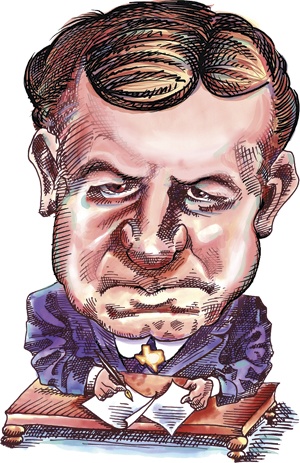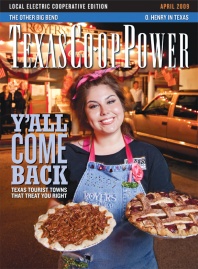Of the more than 300 short stories written by William Sydney Porter under the pen name of O. Henry, about 50 of them were based on his life and times in the West. Many reflect the nearly 16 years he lived in South Texas, Austin and Houston.
Porter was 20 in 1882 when a family friend invited him to come and live on sheep and cattle ranches that the family managed on the Nueces River. Porter was a guest, but he worked alongside the ranch hands, listened to their short and tall tales around the campfires, rode the range with them, and witnessed firsthand the range wars between the cattlemen and rustlers. Everything he saw and heard stuck in his mind like a burr.
For his Texas stories, he created more than 200 characters, composites and variations of the men and women he had seen, lived among and worked with: cowboys, outlaws, train robbers, saloon keepers, gamblers, prospectors, tramps, swindlers, general store proprietors, lawmen, schoolmarms—characters he could choose from to populate his stories like a casting director with a corral full of actors.
One character took on a life that has lasted more than a century: the Cisco Kid, a complex good guy/bad guy who became a staple of every form of storytelling in the 20th century, down to a 1972 song called “The Cisco Kid” by the group War.
Porter depicted his characters at work, as seen in this passage from “The Higher Abdication”:
“Six cowpunchers of the Cibolo Ranch were waiting around the door of the ranch store. Their ponies cropped grass near-by, tied in the Texas fashion—which is not tied at all. Their bridle reins had been dropped to the earth, which is a more effectual way of securing them (such is the power of habit and imagination) than you could devise out of a half-inch rope and a live-oak tree.”
When Porter visited nearby San Antonio, he tucked away pictures of the sidewalk games of chance, the drifters looking for a handout, the city folks with their fancy clothes and the city itself. Such imagery found a place in “The Higher Abdication”:
“The winding, doubling streets, leading nowhere, bewildered him. And then there was a little river, crooked as a pot-hook, that crawled through the middle of the town, crossed by a hundred little bridges so nearly alike that they got on Curly’s nerves.”
Porter saw the temporary tent towns, where every other storefront was a saloon or gambling room or both that moved with the railroad construction gangs crossing the nation, and he witnessed the outlaws and ranch hands fogged with whiskey who shot up the towns on their way out. A passage from “The Reformation of Calliope” reads: “Glass fell like hail; dogs vamosed; chickens flew, squawking; feminine voices shrieked concernedly to youngsters at large.”
In addition to his two years on the ranch, Porter’s Texas influences included working at the state land office and a bank in Austin and a newspaper in Houston. His position as a draftsman at the land office led him to a search for the Lost Bowie Silver Mine that introduced him to the Hill Country. Following the directions on a 30-year-old document, Porter and two others set out through Pleasant Valley, Dripping Springs, Johnson City and Fredericksburg to Menard County. The directions were too vague, and they never found the treasure.
As a bank teller, Porter was responsible for the accounts each day. Somebody had been dipping in the till. Numbers didn’t balance. Banking regulators noticed. Porter, charged with embezzlement of money, took the rap and went to prison. The experience taught him about bank frauds and bank examiners, and they became story devices. Even his time in prison, where he heard the adventures of a train-robbing cellmate, gave him material for stories of outlawry that ring with authenticity.
Unlike Zane Grey, the most widely read writer of Western fiction who visited the Southwest but never lived there, Porter’s Texas stories are based on personal experiences, his keen ear for dialogue and powers of observation.
——————–
Norman L. Macht wrote about the Newton Gang in the October 2008 edition of Texas Co-op Power.


